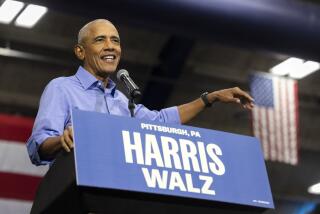Obama denies wavering on Iraq
FARGO, N.D. â Barack Obama struggled Thursday to explain his plan to end the war in Iraq, calling a rare do-over news conference to insist that he was not softening his campaign pledge to withdraw all combat troops within 16 months of becoming president.
âThat position has not changed. I have not equivocated on that position. I have not searched for maneuvering room with respect to that position,â he said.
In his initial remarks on an airport tarmac here, Obama had emphasized caveats that seemed to suggest his timetable might slip, saying he would ârefineâ his policies after he consulted with U.S. generals on a trip to Iraq he plans to make this summer.
The confusion underscored the challenge Obama confronts on his signature issue. In the primary season, he stressed his promise to bring the troops home by a firm date, and it helped propel him to become the likely Democratic nominee. Now, as he faces an opponent who is a war hero, and tailors his message to the broader electorate, he is also trying to present himself as a commander in chief who will listen to the military brass.
Obamaâs attempts to explain his stance could leave some Democratic voters disenchanted. Since locking up the nomination, he has moved toward the political center. He has downplayed his criticism of the North American Free Trade Agreement, opted not to stick to campaign spending caps and backed a bill that bars invasion-of-privacy lawsuits against phone companies that cooperated with President Bushâs wiretapping program.
Larry Ceisler, a Democratic political consultant, said he was not surprised Obama sought to persuade voters that he was not backing down.
âMaybe the war issue, on top of everything else, was a little too much a little too fast. And he needed to reassure his base that, on this hallmark issue, his position today is no different from when he started this campaign,â Ceisler said.
Republicans moved quickly to exploit the commotion over Obamaâs comments.
âIraq was the defining issue of Obamaâs primary campaign, and now it is defining him as the self-interested, typical politician he really is,â Republican National Committee spokesman Alex Conant said. âObamaâs Iraq problem undermines the central premise of his candidacy and shows he places political expedience above everything and anything else.â
In the past, Obama has stressed his plan to begin a withdrawal immediately and complete it within 16 months. But he has carefully hedged, leaving the option of taking more time if needed. His website, however, flatly states that he would âhave all of our combat brigades out of Iraq within 16 months.â
On Thursday, Obama shifted his emphasis in his first news conference, choosing to stress his need to consult with the militaryâs top leaders.
âIâve always said that I would listen to commanders on the ground. Iâve always said the pace of withdrawal would be dictated by the safety and security of our troops and the need to maintain stability. That assessment has not changed,â he said. âAnd when I go to Iraq and have a chance to talk to some of the commanders on the ground, Iâm sure Iâll have more information and will continue to refine my policies.â
He also chose not to make a case for the hard timeline that he laid out in the primary season. âMy 16-month timeline, if you examine everything that Iâve said, was always premised on making sure that our troops were safe,â he said.
Obamaâs statements led to news reports that he was backing away from his plan.
The stories eclipsed the purpose of his trip to North Dakota, which was to call for improved benefits for veterans.
The Obama campaign quickly realized that his comments had caused confusion and sent an e-mail to reporters with a series of his past statements on Iraq to try to show his position was unchanged.
Then Obama reemerged. He looked and sounded frustrated. âWeâre going to try this again,â he said. âApparently, I was not clear enough this morning.â
This time, he forcefully laid out his withdrawal proposal.
âLet me be as clear as I can be. I intend to end this war,â he said. âOn my first day in office, I will bring the Joint Chiefs of Staff in and I will give them a new mission, and that is to end this war responsibly, deliberately but decisively. And I have seen no information that contradicts the notion that we can bring our troops out safely at a pace of one to two brigades a month. And again, that pace translates into having our combat troops out in 16 monthsâ time.â
Although the economy has been the dominant issue on the campaign trail in recent weeks, the candidates have frequently sparred over Iraq.
The presumptive Republican nominee, Sen. John McCain, a former Navy pilot who spent 5 1/2 years as a prisoner of war in Vietnam, championed the troop surge and has questioned whether Obama understands its success. He has challenged Obama to visit Iraq -- even offering to accompany the Illinois senator to help âeducateâ him.
Obama has dismissed the invitation as a stunt. And his campaign has ridiculed McCain as out of touch, mocking inaccurate statements he made about troop levels.
On Thursday, Obama blamed the Arizona senator for stoking perceptions that he has wavered in his commitment to end the war. âI think what has happened is the McCain campaign primed the pump with the press to suggest we were changing our policy when we havenât,â he said.
McCainâs campaign accused Obama of abandoning his pledge to withdraw troops immediately from Iraq.
âToday, Barack Obama reversed that position, proving once again that his words do not matter,â McCain spokesman Brian Rogers said. âHe has now adopted John McCainâs position that we cannot risk the progress we have made in Iraq by beginning to withdraw our troops immediately without concern for conditions on the ground.â
McCain, however, has also altered his position. In May, after spending months scolding opponents who proposed withdrawal timetables, he reversed course and said he hoped to see most troops home by 2013.
In the primaries, he had insisted that Obama and New York Sen. Hillary Rodham Clinton were emboldening Americaâs enemies with their call for a withdrawal, which he said amounted to waving âthe white flag of surrender.â
--
--
Times staff writer Maeve Reston contributed to this report.
More to Read
Get the L.A. Times Politics newsletter
Deeply reported insights into legislation, politics and policy from Sacramento, Washington and beyond. In your inbox three times per week.
You may occasionally receive promotional content from the Los Angeles Times.










